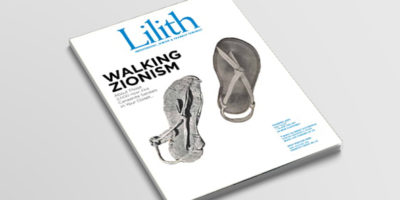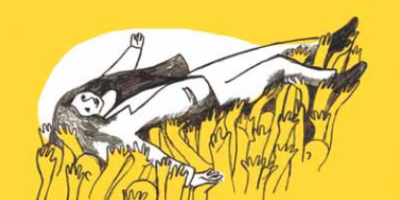
Probabilities
A short story
Ryan proposed on Valentine’s Day, 2009, arriving home with his lunch pail and one red rose, the twins jumping and giggling and clapping. Did the girls attach some significance to one red rose? Had he been watching reality TV with them on those nights when Jane was at the high school trying to teach color theory and abstract interpretation to folks who wouldn’t paint a rose without first counting every petal? Even with Ryan’s income from his plumbing business, his pickup truck now parked in her driveway, Jane couldn’t quit working, at the very least to remind herself that he wasn’t her husband, wasn’t the girls’ father, she was still responsible. But if his idea of watching them while she taught adult-ed evening classes was to turn on The Bachelor (or was it The Bachelorette?), then she might not, in fact, be very responsible in the choosing-a-new-father department.
Hadassah stage-whispered, “The box, where’s the box?” And Esther actually reached her hands into Ryan’s pants pockets from behind, while he stood at the kitchen sink scrubbing fingers black with grease from installing toilets all day at the new over-55 condos across town. Valentine’s Day, 2009, was a Saturday, but plumbers work on Saturdays, and Jane had taken her girls to ballet that morning, not to Shabbat at shul. They were still in their tutus, pushing and shoving in an un-ballerina-like way for a turn at Ryan’s pockets. So, they knew what was coming. He’d apparently brought them in on his plan. Sweet and simultaneously scary, as if they were ganging up on her.
The box proved to hold a ring from one of Ryan’s Irish great-grandmothers, a speck of a diamond set in Art Deco filigree. The box itself looked as old as the ring, black velvet worn bare by generations of fingers opening and closing. Inside, Ryan showed her a matching wedding band, a thin circle scattered with tiny diamond chips. Jane’s immigrant great-grandmothers hadn’t owned diamonds, certainly no engagement rings, and only solid (although equally thin) gold wedding bands, like Jane’s first wedding ring, the one Brian had bought her, as per Jewish law, no stones to interrupt the unbroken circle, meant to represent the unbroken course of a marriage.
That ring, Brian’s solid wedding band, Jane had finally twisted off one day just this past fall, after Ryan had moved in, October, Yom Kippur actually, blaming swollen fingers from traditional Yom Kippur Indian summer heat. On that day, when she was supposed to have been fasting as the final step towards atonement before being sealed in the so-called Book of Life, she’d been in the kitchen, feeding the girls lunch (bagel with butter for Estee, with cream cheese for Das), unwrapping lox and smoked whitefish in preparation for the evening’s traditional break-fast meal (which would have to wait until after sunset, when her mother would arrive from concluding services at synagogue). Ryan had made his own sandwich and eaten it somewhere out of sight, so as not to tempt her, muttering something about the temptations of Christ as he’d left the kitchen. To Ryan, all religion was malarkey.
Brian’s ring must still be somewhere in this kitchen right now, as Ryan slipped his new/old engagement ring on Jane’s finger. “Does it fit?” “I told you it’d fit.” The girls clamored, with giggling and shushing and conspiratorial tugging at Ryan’s shirtsleeves. There had apparently been secretive sizing of this ring via stealthy matching with one of Jane’s old rings, maybe that very gold band from Brian, which she was sure still lay in the custard cup where she’d left it, in one of these kitchen cabinets, behind a closed door.
Jane had a steak marinating on the counter, instead of the mac-and-cheese or spaghetti that she and the girls had grown used to, before Ryan. It was, after all, Valentine’s Day. But he said to put it back in the fridge for tomorrow. “No cooking for you tonight,” he said, squeezing her hand with the ring that fit perfectly. “We could go out, but I thought pizza with the girls?” So the girls snacked on his organic blue corn chips that now lived in Jane’s pantry, while he showered and headed back out into the bitter February night with damp hair (risking pneumonia, her mother would say) and a fresh shave, (an evening shave, don’t think what her mother would say about that, the same thing Jane was thinking, anticipating).
He returned with a veggie pizza plus one small plain pizza (in case the girls weren’t in the mood for vegetables) and one small white pizza (in case Estee wasn’t in the mood for sauce). Also, balloons, which were pink, with Strawberry Shortcake and Happy Birthday! — not because the store was sold out of Valentine’s Day balloons, but because the next day the girls would turn eight.
Brian and Jane had planned to ignore Valentine’s Day, after the girls, not to detract from their February 15th birthday, although Brian had never trusted that was really their birthday. “How do we know for sure?” he’d said. “How do they know?” referring to the Korean orphanage and the mystery of the girls’ birth halfway around the world. They were six months old when they’d arrived, or were they? “When my great-grandfather came from Russia,” Brian had said, “he picked Christmas for his birthday. And his name was Jacob, not Jesus.” Despite his doubts, Brian had insisted, “Let it be their day, their week. We can celebrate Valentine’s Day any time, maybe in August, like a half-birthday. Who’s Saint Valentine to us, anyway?” By the following August, Jane had found herself preparing not for a summer Valentine’s Day but for her first annual public kaddish in shul.
Ryan thought the same as Brian, but different (like their names), figuring out how to make Valentine’s Day — and his proposal — about Jane, but also about the girls. “A birthday gift,” he whispered in bed that night, reaching around, in the dark, to feel for the ring on her finger, “for all of us.” Then he ran his hand up the length of her arm, her shoulder, the bumps of her spine. They’d learned how to make love, quietly, with Esther and Hadassah asleep across the hall.
“That’s the same name, you know,” Brian had said way back when those first photos had arrived from Korea, scrawny twins wrapped in one blanket, like a tiny two-headed Janus, God of beginnings. “Doesn’t Hadassah mean Esther in Hebrew?”
“I know,” Jane had said. “From the Hebrew for myrtle.” She’d recited from the midrash in her baby name book. “Just as a myrtle has a sweet taste and a bitter smell, so too the biblical Esther was good and listened (‘sweet’) to the righteous Mordechai but was also strong and fierce (‘bitter’) against the evil Haman.” The best of both worlds for those girls. And they’d needed it, the sweetness and the strength.
“You like him because of his name,” her mother had said, only once, about Ryan, who carried a toolbox instead of a laptop. “It reminds you of Brian.” Ryan had no idea that Hadassah meant Esther in Hebrew, and if he thought about the Ryan/Brian similarity, he was careful never to mention it.
The phone startled Jane at 6:30 the next morning. “You didn’t know it would be me?” her mother said. “As if I wouldn’t call on their birthday?” Jane’s mother often called early on Sundays, her way of reminding, without saying, that Jane ought to enroll the girls in Sunday school.
“I didn’t know anything, Mom,” Jane said. “I was asleep.” The girls came running in their pajamas, squealing “Grandma!” They knew who would call on their birthday morning. The ringing of the phone didn’t frighten them.
“Do you love him?” her mother asked when she called back later that day.
“What is this, Fiddler on the Roof?” Jane replied.
“Can I help with dinner?” her mother changed the subject. She always came for the girls’ birthday.
“Could you pick up the cake at Stop & Shop? I ordered it for after 3:00, so they’d be sure to bake it fresh today.”
“I’m making babka,” her mother said. “Chocolate, their favorite. Already on the second rise.” Then, “Oh well, never mind. Two girls, two cakes. It’ll be perfect.” Jane’s mother sometimes forgot to be careful with Jane, but then she remembered.
In the early years, before Ryan, maybe even before that first kaddish, her mother had held secret conversations with the rabbi, secret until she’d started dropping tidbits of his advice into otherwise casual conversations with Jane about the price of cornflakes or weren’t the girls old enough for potty training. To remarry (“Someday,” her mother had always stressed, “I’m only imagining, it never hurts to think ahead.”), she would need a beit din, a Jewish court, to certify that her husband was no longer alive. This was a problem for the 9/11 widows. The beit din could not rely on probabilities. Lacking a body, a “corporeal body” (Had the rabbi really said those words? Had her mother really repeated them to Jane?), the judges would need witnesses, evidence, proof beyond supposition that Brian was dead.
He had, after all, escaped once. Of that, Jane had evidence, one phone call, Brian’s I’m okay phone call, his I’m okay recorded inside a machine that she would never throw out, although the technology to replay it would surely someday be as extinct as Brian. And what of the second phone call, Brian’s I’m going back up call, the call she had answered, the call she’d waited frantically by the phone to be sure not to miss? Of that Jane had no corroborating evidence.
Maybe those rabbis, surely all men, would think she should have let the machine pick up that second call, too, should have heard Brian’s final words only through the distance of magnetic tape, just so that now she’d have proof. But proof of what? Proof he’d started back up, proof he’d said he was starting back up, still not enough to prove he had actually died, been disintegrated, disappeared into what most people referred to as thin air, a sickeningly wrong cliché.
As if Jane hadn’t wished, night after night after sleepless night, that the opposite could somehow be proven true. That he hadn’t gone back up. That he was lying unconscious or amnesiac in a hospital somewhere, would one day awaken like Sleeping Beauty and walk back through her door. Or maybe he’d had second thoughts about parenthood, even about marriage, had grabbed his chance, fled to South America, anywhere, somewhere alive. She’d forced herself to figure out this new Facebook, had posted pictures of the girls — maybe he’d see what he was missing and come home — until her mother pointed out the risk of exposing her girls to the public. “They’re rich girls now,” her mother had said, “or at least that’s what people think. And there are a lot of crazies out there.” Jane could never imagine suddenly reversing course, concentrating all her energy on wishing to prove Brian dead.
Of course, all this was only relevant if she were to remarry a Jew. Even then, would she bother with a beit din? Jewish law hadn’t exactly kept its promises to her in the past.
After carrying in both cakes from the car in winter’s dark that made late afternoon feel like midnight, before even kissing the girls and giving them their presents, Jane’s mother pulled off her gloves, took Jane’s warm hand in her two cold ones, to admire the ring. “It’s lovely,” she said. “Just let me get my glasses. Where did I put my purse?”
“It’s still on your shoulder, Mom,” Jane said, reclaiming her hand. “I’ve gotta put on my boots.” She’d shoveled a path to the patio grill, for the steak, which would suffice for the three adults, since the girls wanted their favorite spaghetti (plain for Estee, with Ragu for Das). Jane never broiled in her kitchen, not even in February, not even with the exhaust fan on for the smoke.
“You should only be happy,” her mother soothed.
The girls ate in the Disney princess dresses her mother had brought for their birthday. Then they blew out candles on both cakes. “I thought for Purim,” her mother said. “The dresses. They could both be Queen Esther.”
“Hadassah’s working on her own costume,” Jane said, “binoculars out of toilet paper tubes. I think she’s going as a bird watcher.” Jane had never admitted to Brian that she’d picked the names Esther/Hadassah at least in part because of her memories of dressing up as Queen Esther on Purim. Her mother had once found an old wedding dress at a thrift shop, and, with tucking and hemming, that dress had lasted through years of Sunday-school Purim parades. One year, Jane had been allowed to add one of her mother’s old pillbox hats, once her pearls.
After dinner, while her mother tried to wash off green, possibly dangerous supermarket frosting from the girls’ fingers, and lips and tongues, Jane and Ryan brought out their gifts — art supplies, grown-up art supplies, selected by Jane with care, paints and oil pastels and watercolor pencils, all organized in fishing-tackle boxes, just like hers. Her fishing-tackle box had been Ryan’s suggestion, one day after he’d first moved in, when he’d been moving around her art stuff in the basement, looking for a place for his tools and table saw.
“Let’s paint,” they insisted. “Now.”
“Just one,” Jane said. “In the basement, then bed. There are new easels, wait ’til you see. Kiss Grandma goodbye first.”
“I’ll help with the dishes,” her mother said, carrying plates to the sink. “Tell me about those condos of yours, Ryan. Should I sell the house and buy one?” At least she didn’t call him Brian.
Esther, who refused to take off her new Cinderella dress, but also didn’t want to get it dirty, drew a flower garden with watercolor pencils, to be brushed over with water tomorrow. And Hadassah, back in jeans and a polo, sleeves pushed up to reveal golden brown arms even in February, painted a family: a mother, a father, and two children, both girls. Without help from Jane, she rummaged through her box and found the tube of raw sienna Jane had bought — not perfect, but better than any kids-paint-set color for painting the girls’ faces and also their hands sticking out from their princess dresses.
After Jane’s mother finally went home, while Ryan emptied the dishwasher, Jane tucked the girls into bed, too late for a bath, Estee’s hands still green from frosting, Das’s streaked with every color of paint, what would the teacher say tomorrow? Later, in her own bed with Ryan, after one more midnight tuck-in and whispered happy birthday, she lay awake wondering where their mother was tonight, their other mother, wishing she was the one who could remember the day of their birth.
“We’ll go shopping on Saturday,” Ryan interrupted, his arms encircling her.
“Huh?”
“For a solid gold band, for the wedding.”
“When did she get to you?”
“Who?”
“My mother.” Jane rolled over to face him in the dark. “When did she talk to you? I should’ve known why she stayed to help with the dishes.”
“Don’t,” he said, putting one finger to her lips. The backs of his hands were smooth and hairless from all the time they spent in water, but his fingertips were callused. He wouldn’t be wearing a wedding ring, as Brian had, too dangerous in his line of work — he’d once known a man who’d somehow snagged his wedding ring on a power snake and nearly lost a finger.
“Rabbis and their rules,” Jane said. “If I don’t care, why should you?”
“It’s a nice idea,” he said, “the circle of life.”
“First Fiddler on the Roof, now a Disney movie?”
“Huh? I’m serious,” he said, tightening the circle of his arms around her body. “Forever.”
Ryan wasn’t her mother, and he wasn’t Brian. He was himself. He rotated her tires and cleaned her gutters and taught her girls to flip pancakes. He’d built the girls’ new easels from scratch, in her basement, their basement — professional-looking A-frame wooden easels measured to just the right height for eight-year-olds. And in bed, after making love, he hummed, sometimes “Total Eclipse of the Heart,” as if he’d known Jane since she was twelve. He would be as foreign to those beit din judges, in their long beards and side curls, as they were to Jane. But he wasn’t foreign to Jane, not anymore.
“Okay,” she said, recognizing the contours of his face in the shadows, “but your ring, too.” She would wear his great-grandmother’s wedding band, with its diamonds so tiny maybe her mother wouldn’t notice. But if a solid gold band, for the ceremony, might give them a chance at forever, who was she to say no?
Elizabeth Edelglass’s story “Variables” won the 2005 Lilith Short Story Contest. Her stories have appeared in Michigan Quarterly Review (winner of the Lawrence Foundation Prize), In The Grove (William Saroyan Centennial Prize winner), American Literary Review, The Ilanot Review and more. She is currently at work on a story collection and two novels.



